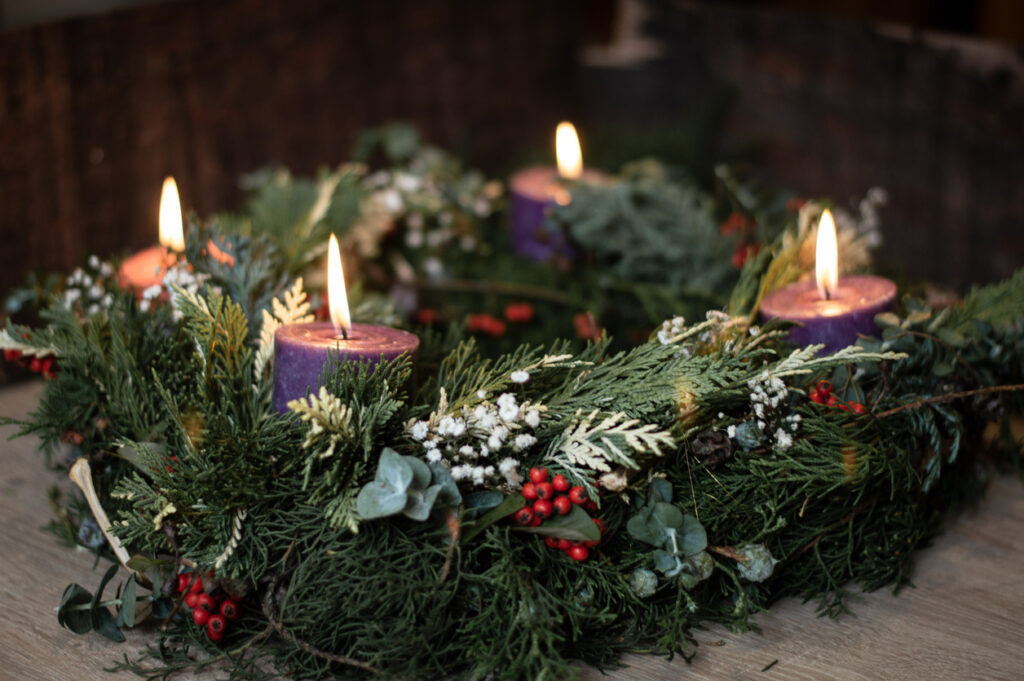This year, Christmas Eve falls on the Fourth Sunday of Advent. Years ago, when I chaired the liturgical environment committee a tour parish, the quick turnaround of celebrations was our worst nightmare.
Our pastor was adamant that there would be no semblance of Christmas decorations in the sanctuary until the liturgies for the Fourth Sunday of Advent had ended. As you can imagine, committee members scrambled throughout the afternoon, replacing the Advent wreath and purple banners with Christmas trees, the crèche and poinsettias. And yet, before worshippers began to arrive for the first Christmas Eve Mass, everything was in place. Breathing a sigh of relief, we congratulated one another on a job well done, and jokingly referred to the transformation as the year’s first Christmas miracle.
Now thirty-plus years later, introducing Christmas trees, an empty crèche and poinsettias to the worship space during the remaining days of Advent is acceptable to some. However, feelings of urgency remain, though for a different reason.
A shorter Advent this year means we have only three full weeks to prepare our hearts for the celebration of Christ’s coming. With fewer days, there’s no time to procrastinate. Advent is about keeping vigil and, therefore, every moment counts. To do otherwise is to become oblivious to the event that changed the world.
In her autobiographical account, “Life in A Jewish Family,” Edith Stein describes a conversation she had with her mother after Edith converted to Catholicism. Referring to Jesus, Frau Stein said, “It’s not that I have anything against him. He was a good man, but why did he have to go and make himself God?”
Reflecting on the conversation, a different version of the question comes to mind: Why did God have to make himself man? It’s a question that has plagued believers and non-believers alike. The mystery of the Incarnation is so incredible that on an intellectual level, we’ll never be able to wrap our minds around it.
St. Thomas Aquinas argued that even if the Incarnation was not absolutely necessary, since God could have redeemed us in other ways, there was a certain “necessity of convenience, a fittingness in the Incarnation of God.” He added that by the mysteries of his bodily life, Jesus called humankind to a spiritual life.
In becoming one of us, God demonstrated the dignity of human nature and revealed the immensity of his love for humanity so that we might return that love. In becoming man, God unites human intellect with his Spirit, thereby offering us the hope of obtaining eternal life.
He chose to become man, just as the Blessed Virgin Mary consented to the miracle and said, “Let it be done to me.” God never imposes his will on those to whom he has given the freedom to choose, even when it involves an act as important as the salvation of humankind.
Mary’s consent had implications that reached far beyond her own life. In consenting to become the vehicle through whom the Word of God was spoken, she shows us how to live the purpose for which he created us. But because of the fall of Adam and Eve, we spend our lives striving to become the person that God created us to be.
The path to becoming our true self is a tortuous path with twists and turns, detours and regressions of our own making. And yet, God continues to call us to himself, making crooked ways straight so that we can awaken to the fullness of life in him, not only in heaven, but right here on earth.
Mary, who is the new Eve, had the singular privilege of having her womb be a home for the Incarnate Son of God. Let us turn to her with grateful hearts, especially during Advent, and ask her to help us prepare for her Son’s coming so that we may receive the Prince of Peace worthily on the day of his birth and every day thereafter.
May Christ’s peace reign in our hearts and may the flame of his love transform our world!
Barbara Hughes is an award-winning author, retreat facilitator and spiritual guide. She lives in Virginia Beach and can be reached at [email protected].

